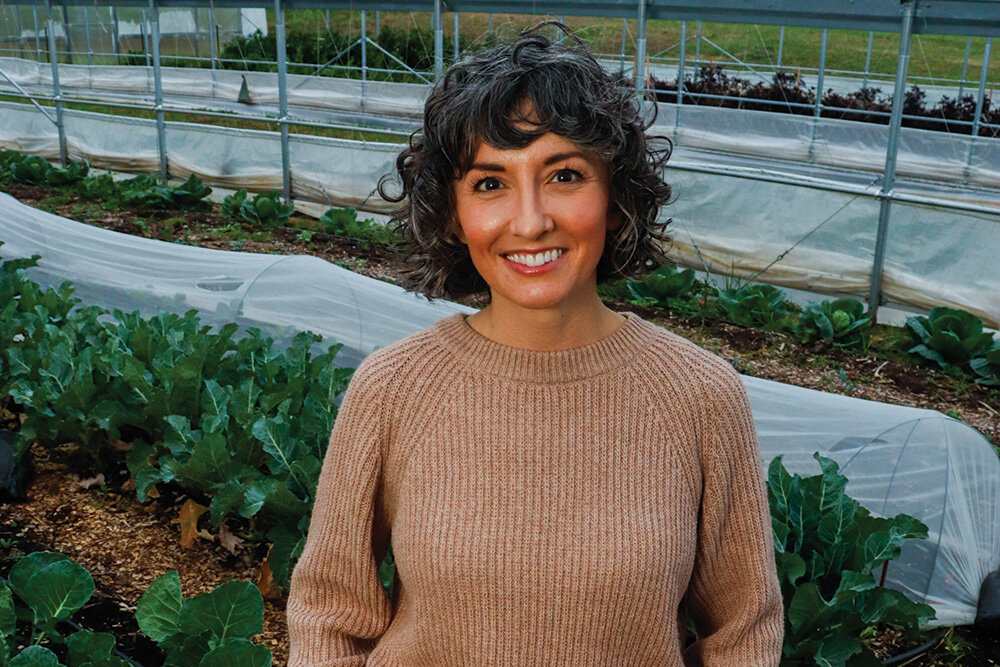YOUR BUSINESS AUTHORITY
Springfield, MO
YOUR BUSINESS AUTHORITY
Springfield, MO

CoxHealth’s HealthScripts program launched this year with funding from a U.S. Department of Agriculture grant secured in partnership with Springfield Community Gardens. The program provides fruits and vegetables grown locally, including on Cox’s campus, to low-income patients. What’s behind this focus on food as a critical part of health care?
What we hear a lot in our patient population is people can’t afford food because they’re paying for medicine. That’s a hard decision to make. When we look at the majority of chronic diseases in our U.S. population, food does play into that. Instead of giving someone something for constipation in a pill form, why don’t we just get your fiber increased in your diet or start looking at your diet and making some substitutions? It’s utilizing the nutrient-dense produce to supplement what a pill might try to mimic or create, but do it in a way that’s filling of the stomach. As Dr. [Kristin Aden] Crymes and I look into this more and read and go through our own process, we realize there’s more to it than just what you’re eating to make your mouth and your brain feel good. How is your body responding to it? You don’t have to make a decision between your food and your medicine because your food is your medicine. This wouldn’t be possible without SCG. Working with them has been eye-opening to how important it is to have community partnerships. They see a different perspective in the community than we do in the tower of our clinic. They listen to people. They know what people will eat or what they won’t eat. They help us understand our community needs better. This is going to take a community effort; the hospital system, the doctors are not going to do it alone.
In the Global Burden of Disease study published by the National Library of Medicine, poor diet was found to be the leading cause of premature death. What are the opportunities for a systemwide approach to thinking of food as medicine? The pilot of HealthScripts provided funding for 100 patients – that’s a start but a drop in the bucket of your patient population. Does education of physicians come into play?
I think it does. It needs to start at the school level and then also at the practicing level. When I graduated medical school, education on nutrition was limited to just a few hours. We did not get the information that we needed to help people talk about or be equipped with things to prevent their chronic diseases. That education needs to be in the school, which is why we’re working with the medical students on their clinical rotations here. Also, for the practicing physicians, there’s so little time in our office visits to get to talk about nutrition. And again, that’s information we have to seek out on our own outside of our daily work hours. In our shared medical visits, we talk about nutrition and we provide produce. If it’s very integrated into the health care system, perhaps the physician who might not have time to supplement their education could say, “I’ve got a partner across town who has this clinic up and running or can consult on this.” Some of our patients can’t get access to dietitians because insurance doesn’t cover that visit unless they have either diabetes or chronic kidney disease, for instance.
A review of medical schools in the U.S. found students get less than 20 hours of nutrition education. And the Physicians Committee for Responsible Medicine nonprofit association reports 73% of physicians feel that patient visits should include nutrition guidance, but just 15% feel prepared. What outcomes have you seen when those conversations are had?
Two patient experiences come to mind. The first was a patient with nonalcoholic steatohepatitis. It wasn’t related to alcohol, but his liver was pretty much infiltrated with fat. We talked about the dietary patterns he was having. He was commenting on his carbohydrate consumption, and he recognized when that increased, he felt awful. Well, if your body has excess carbohydrates and sugars, it’s going to store that as fat in your liver. You’re just kind of feeding that process. He just had that epiphany. That was a conversation I never could have had before taking some time to seek out education. Another patient (recently) was talking about after she had bariatric surgery, she’s watching her carbs. I said, let’s talk about carbs because there’s different carbs; there’s simple carbs and there’s complex carbs. If you’re going to eat some carbs, make it something that’s with fiber: a fruit, a vegetable, a whole grain. With our patients, their pain is improving, they’re feeling more energized, their hemoglobin A1Cs are dropping. I can share those hopeful stories with patients.
Where did your passion for this concept of food as medicine come from?
It started with some documentaries like “Forks Over Knives,” and then I started adopting those practices and recognizing how my body responded to that with pain and inflammation and energy. That was a slippery slope into how food impacts health. Our residency program has just been established as a lifestyle medicine residency. We’re getting more like formal curriculum for our residents. It was seeing the benefits and thinking about the sustainable nature of it and knowing how those conversations went when they were just ended with a prescription. Once I started looking into it and actually adopting those myself, that’s where it really just being the way of life for me, and to practice in accordance with that just feels genuine.
Moseley’s Discount Office Products was purchased; Side Chick opened in Branson; and the Springfield franchise store of NoBaked Cookie Dough changed ownership.